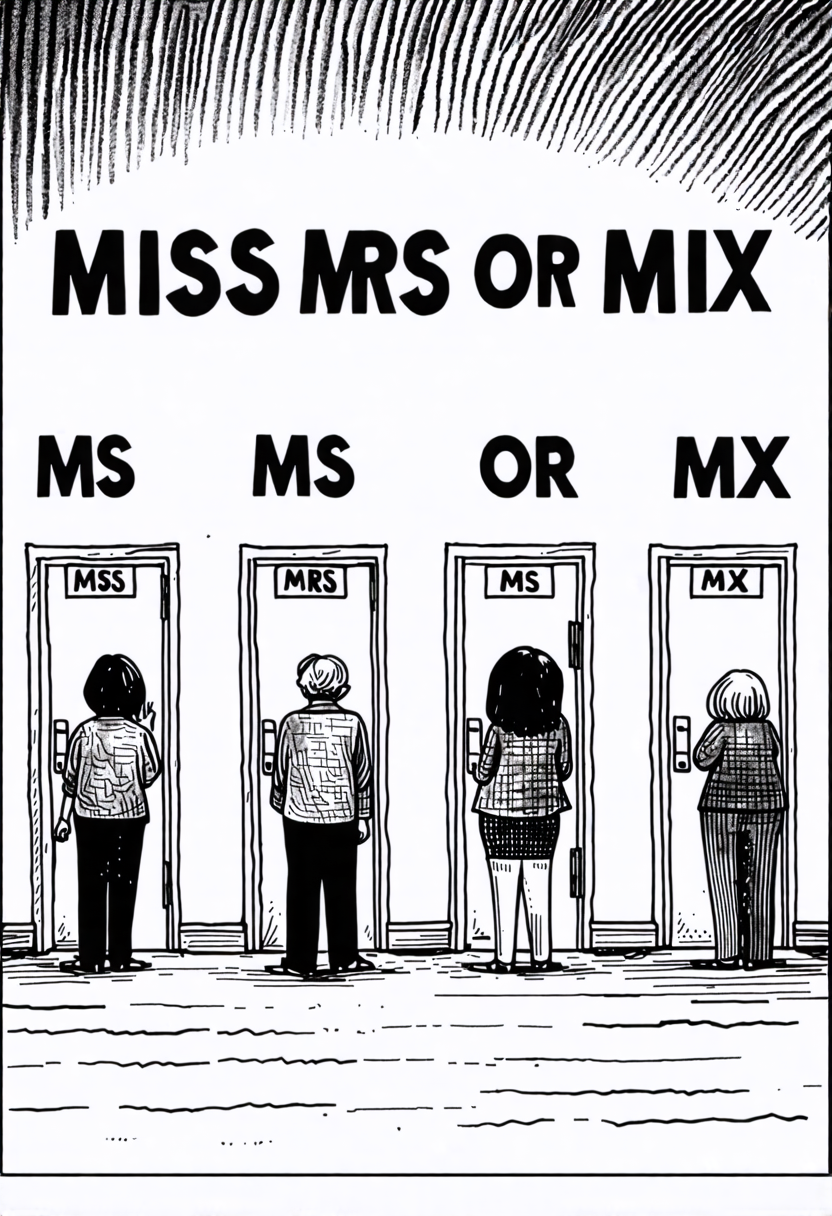Miss, Mrs., Ms. or Mx.
Understanding the distinctions between ‘Miss,’ ‘Mrs.,’ ‘Ms.,’ and ‘Mx.’ is essential for respectful and inclusive communication. ‘Miss’ is used for unmarried women, while ‘Mrs.’ denotes married women. ‘Ms.’ offers a neutral alternative, suitable for all adult women regardless of marital status, reflecting modern gender equality. ‘Mx.’ is a gender-neutral title, inclusive of non-binary individuals, signifying societal progress towards inclusivity.
Importance of Correct Titles
Using the correct titles when addressing individuals is essential for demonstrating respect and professionalism. Titles such as ‘Miss,’ ‘Mrs.,’ ‘Ms.,’ and ‘Mx.’ each convey specific social and personal information about the individual. Correct usage helps avoid misunderstandings and shows awareness of social norms.
It is important to recognize and use the preferred title of each person, as it reflects their identity and status. This practice fosters an inclusive environment and guarantees effective communication. Incorrectly addressing someone can lead to discomfort or offense.
Traditional Use of ‘Miss’
Traditionally, ‘Miss’ is a title used to address young girls or unmarried women. This title reflects a person’s marital status and is often associated with youth and singlehood. In formal settings, using ‘Miss’ can signify respect and politeness.
Here is a simple table outlining the traditional use of ‘Miss’:
| Title | Usage | Example |
|---|---|---|
| Miss | Unmarried Women | Miss Jane Doe |
| Miss | Young Girls | Miss Emily Smith |
| Miss | Formal Correspondence | Dear Miss Johnson |
Role of ‘Mrs.’ in Society
‘Mrs.’ frequently signifies a woman’s marital status, denoting that she is married. This title traditionally reflects a woman’s connection to her husband, indicating a societal role tied to marriage.
In many cultures, ‘Mrs.’ is seen as a mark of respect and recognition of a woman’s partnership. It is commonly used in formal settings and correspondence. However, its usage has evolved, and some women may choose not to use ‘Mrs.’ to avoid highlighting their marital status. This reflects broader changes in societal norms and gender roles.
Emergence of ‘Ms.’
The title ‘Ms.’ emerged as a neutral alternative to ‘Miss’ and ‘Mrs.’ during the women’s liberation movement. It was introduced to provide a title for women that did not indicate marital status, promoting gender equality.
This movement aimed to challenge societal norms by addressing women without reference to their marital status, promote professional equality by allowing women to have the same professional respect as men, and enhance individual choice by giving women the freedom to define their identity.
‘Ms.’ quickly gained acceptance in both professional and social contexts. It recognized women as individuals, independent of their relationships. This title is now widely used, reflecting a significant shift towards gender-neutral language and equality.
Introduction of ‘Mx.’
Introduced as a gender-neutral title, ‘Mx.’ provides an inclusive option for individuals who do not identify with traditional gender binaries. It emerged as a response to the need for more inclusive language. ‘Mx.’ is used by people who are non-binary, genderqueer, or prefer not to disclose their gender.

This title is becoming more widely recognized and accepted in various professional and social contexts. It is pronounced as ‘Mix’ or ‘Mux’ and can be used in place of ‘Mr.’, ‘Mrs.’, ‘Miss’, or ‘Ms.’. The adoption of ‘Mx.’ reflects a growing awareness and respect for gender diversity. It signifies progress towards a more inclusive society where everyone’s identity is acknowledged and respected.
Respecting Individual Preferences
Respecting individual preferences in the use of titles and pronouns is essential to fostering an inclusive and respectful environment. When addressing someone, it is vital to use the title they prefer. This shows respect for their identity and builds trust.
Ask for Preferences: Always inquire about a person’s preferred title and pronouns.
Use Correct Titles: Consistently use the correct titles in emails, meetings, and documents.
Educate Yourself: Stay informed about evolving language and the significance of different titles.
Promoting Inclusive Language
Promoting inclusive language is essential for creating a welcoming and respectful environment. Using titles like ‘Ms.’ and ‘Mx.’ allows individuals to be addressed in ways that reflect their identities. This practice acknowledges the diversity in gender and marital status.
Inclusive language helps eliminate assumptions and biases, fostering a more equitable society. Respecting preferred titles and pronouns shows awareness and sensitivity towards individual preferences. It is a simple yet powerful way to demonstrate respect and acceptance.
Organizations and individuals should aim to use inclusive language in all communications. This practice enhances mutual respect and understanding, contributing to a positive and inclusive atmosphere for everyone.
Gender-Neutral Pronouns
Gender-neutral pronouns, such as they/them, are essential tools for recognizing and respecting diverse gender identities. They provide an inclusive way to address individuals without assuming their gender. Using these pronouns correctly is vital for fostering a respectful and welcoming environment.
- They/them: Used for singular or plural, it is inclusive and avoids gender assumptions.
- Ze/hir: Another set of gender-neutral pronouns, offering more options for personal identification.
- Xe/xem: Less common but equally important, providing further inclusivity.
Title Usage in Modern Times
In modern times, the proper usage of titles is essential for ensuring respectful and effective communication. Titles like ‘Miss,’ ‘Mrs.,’ ‘Ms.,’ and ‘Mx.’ help address individuals appropriately based on their preferences.
‘Miss’ is traditionally for unmarried women, while ‘Mrs.’ is used for married women. ‘Ms.’ serves as a neutral option for women regardless of marital status. ‘Mx.’ is a gender-neutral title, inclusive of all gender identities. Using the correct title shows respect and acknowledges personal identity.
This practice fosters mutual respect and understanding, ensuring that communication remains considerate and inclusive. As social norms evolve, being mindful of preferred titles is vital for promoting a respectful and inclusive society.
Keeping Language Current
Staying updated with language use is essential for reflecting societal changes and respecting individual identities. Language evolves to include diverse identities, making it important to keep up with these changes.
Consider these benefits:
- Inclusivity: Adopting new titles like ‘Mx.’ helps ensure everyone feels acknowledged.
- Respect: Using preferred titles and pronouns shows respect for individual choices.
- Relevance: Keeping language current aligns with contemporary social norms.







